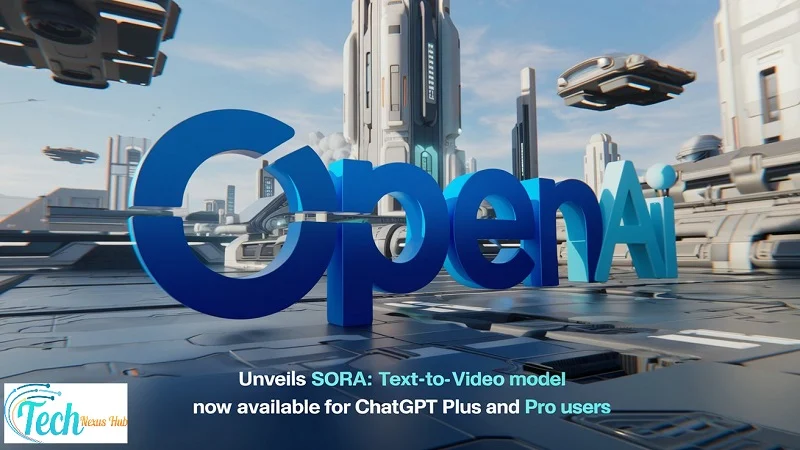Sora, a text-to-video offering from OpenAI, has been released into the world, and ChatGPT Plus and Pro clients can now engage. Unveiled on Monday, this feature represents a major new development in OpenAI’s move towards multimodal AI. As an artificial intelligence technology company, OpenAI’s key intention is to revolutionize content creation and narrative by allowing users to create videos from plain text.
Sora: OpenAI's New Text-to-Video Model Launches for Premium Users
Since the release of ChatGPT in November 2022, OpenAI, backed by Microsoft, has remained at the forefront of the generative AI revolution. Organizations like Meta, Google, or Stability AI have similar tools, and from this point of view, Sora is ready to compete with them. This step strengthens OpenAI’s position as a leader in the competition to create the latest AI technologies even more.
Sora is an intuitive text-to-video model that enables its users to transform captions into short, personalized videos. Such capabilities could be useful in a number of industries, including advertising, education, entertainment, and media industries. Of the premium consumers of ChatGPT, the pioneers will explore the technology in content creation and artistic production.
Upon comparison, it can be noted that OpenAI is making Sora stand out with availability to even inexperienced users while providing such options as token extrapolation and optional AMP. By integrating this tool into ChatGPT Plus and Pro, creators do not have to hop from one platform to the other as they search for ways to enable a new form of creativity.
At a time when so many players are entering the text-to-video competition, Sora can be a great asset to OpenAI in the multiperception AI market. All these have prospects in similar fields, indicating this is bound to turn into a struggle between Meta, Google, and Stability AI over the leadership role in this developing technology.
Sora Turbo: OpenAI's Text-to-Video AI Model Now Available to Premium Users
OpenAI has now made its AI text-to-video model, Sora, available as Sora Turbo for ChatGPT Plus and Pro users. First brought in late February as part of a research sneak peek, Sora was only available to safety testers. Since its inception, OpenAI has kept advancing the generative AI technologies that it offers to the general public.
Sora Turbo provides video creation in resolutions of up to 1080p, thus providing flexibility in the format of widescreen, vertical, and square. Videos can have a length of as far as 20 seconds, which makes the tool great for creating short and laconic content in such fields as social media, advertisement, and story machen.
That is, OpenAI has suggested that it may eventually start charging for the feature to users who are subscribed to the company’s premium tier. ‘We’ve been developing dynamic pricing for different categories of users, which will be launched in early next year,' the company stated in its blog. This infers a premeditated attempt to provide solutions across the corporate spectrum from small independent authors to corporate titans.
With Sora Turbo, OpenAI furthers its standing in the fast-growing field of multimodal AI. The model could compete with Meta Research, Google’s Pathmind, or Stability AI while being integrated into the ChatGPT platform.
The availability of Sora Turbo shows that OpenAI is determined to make sophisticated solutions for AI-based tasks popular. With the help of new and improved AI, this latest release overturned the momentous step in the democratization of video production anywhere in the world and the combination of creativity with AI.
OpenAI Rolls Out Sora Globally, Excludes EU Amid Safety Measures
The Sora Text-to-Video AI has been released globally to ChatGPT users, but it is not yet available in EU countries, Switzerland, and the UK. This limitation is due to the company still struggling to deal with regulatory issues and work towards compliance with very strict data protection laws in the region.
The safety concerns are addressed in a separate section of the ELK blog post, where OpenAI details it now has sufficient systems in place to prevent the misuse of Sora. Namely, the company will prevent the generation and sharing of such content as child sexual abuse and sexual deepfakes. This move reaffirms its commitment towards the right use of AI and the advancement of open and forthright artificial intelligence technology.
Currently, the model has had minimal ability to handle uploads involving human likenesses by the users. ‘People uploads will be restricted at launch,’ but the company plans to expand the feature to more users because mitigations against deepfakes are still in development. All these measures are meant to ensure that the generative video technology has minimized risks that are likely to arise from misuse.
Thus, OpenAI makes use of compromising while keeping some of the services available only in some geographies, and some awesome features are turned off by default. However, when the model evolves, the firm’s intention will be to make it accessible and more useful in a controlled and ethical manner.
Therefore, like most of the OpenAI products, Sora has a gradual rollout that showcases their cautious outlook as they scale these superior AI systems for users to embrace. They may be used as a reference point for other companies in the continually evolving multimodal AI environment.


